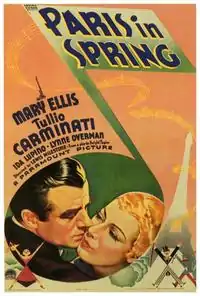| Paris in Spring | |
|---|---|
 | |
| Directed by | Lewis Milestone |
| Screenplay by | Samuel Hoffenstein Franz Schulz adaptation by Keene Thompson |
| Based on | Paris in Spring (play) by Dwight Taylor |
| Produced by | Benjamin Glazer |
| Starring | Mary Ellis Tullio Carminati Ida Lupino Lynne Overman Jessie Ralph Dorothea Wolbert |
| Cinematography | Ted Tetzlaff |
| Edited by | Eda Warren |
| Music by | Harry Revel Mack Gordon |
Production company | |
Release date |
|
Running time | 82 minutes |
| Country | United States |
| Language | English |
Paris in Spring (also released as Paris Love Song) is a 1935 black and white musical comedy film directed by Lewis Milestone for Paramount Pictures.[1][2][3][4] It is based on a play by Dwight Taylor, with a screen play by Samuel Hoffenstein and Franz Schulz.[5]
Plot
Afraid of marriage, Simone (Mary Ellis) ends her long term engagement with her fiancé Paul de Lille (Tullio Carminati). Paul heads to the top of The Eiffel Tower with thoughts of suicide. In another part of Paris, and also afraid of marriage, Mignon (Ida Lupino) decides to separate from her young lover (James Blakely). Despairing, Mignon also climbs to the top of The Eiffel Tower intending to leap to her death. There she meets Paul and the two compare stories. After discussion, Paul dissuades her from leaping and the two conspire to make their respective partners jealous by pretending to have an affair with each other.
Partial cast
- Mary Ellis as Simone
- Tullio Carminati as Paul de Lille
- Ida Lupino as Mignon de Charelle
- Lynne Overman as DuPont
- Jessie Ralph as Grandma Leger
- Dorothea Wolbert as Francine
- Akim Tamiroff as Cafe Manager
- Jack Raymond as Elevator Man
- Arnold Korff as Doctor
- Rolfe Sedan as Modiste
- Arthur Housman as Interviewer
- Jack Mulhall as George, Cafe Simone Doorman
- Elsa Peterson as Hairdresser
- Michael Mark as Bartender
- Billy Gilbert as First Chef
- William Irving as Second Chef
- Francis Ford as Drunken Peasant
- James Blakeley as Albert de Charelle
- Craig Reynolds as Alphonse
- Joseph North as Etienne
- Harold Entwistle as Charles The Butler
- Sam Ash as Clerk
Soundtrack
- "Paris in Spring" by Harry Revel and Mack Gordon, sung by Mary Ellis and Tullio Carminati
- "Jealousy", sung by Mary Ellis
- "Bonjour et Bonsoir", sung by Mary Ellis and Tullio Carminati
Reception and release
The film was first released in US theaters on 28 May 1935. The New York Times reviewer wrote that while Mary Ellis offered a degree of entertainment with her singing, Tullio Carminati did not help the film by treating the film in a burlesque style. The newspaper was of the opinion Ida Lupino and James Blakeley were moderately good in their roles, but any merited praise for acting was to the credit of Lynne Overman, Jessie Ralph, and to the actor in the lesser role of the Chez Simone manager.[1]
Reviewer Graham Greene praised Milestone's emulation of Ernst Lubitsch in his ability to create a film that was a "silly, charming tale", and make something "light, enchanting, and genuinely fantastic" out of a nonsense plot device.[2] Lupino's role in Paris in Spring has been described as "dull", a view she shared.[6]
References
- 1 2 F.S. N. (13 July 1935). "Paris in Spring (1935)". The New York Times. Retrieved 23 April 2011.
- 1 2 Greene, Graham (12 July 1935). "St Petersburg/Paris Love Song/The Phantom Light". The Spectator. (reprinted in: Taylor, John Russell, ed. (1980). The Pleasure Dome. p. 7. ISBN 0192812866.; reprinted in Graham Greene, David Parkinson (1994). The Graham Greene film reader: reviews, essays, interviews & film stories. Hal Leonard Corporation. pp. 7, 8, 9. ISBN 1-55783-188-2.)
- ↑ Leslie Halliwell (1987). Halliwell's Film Guide. Scribner. p. 751. ISBN 0-684-18826-0.
- ↑ "Paris in Spring". TV Guide. Retrieved 23 April 2011.
- ↑ Library of Congress. Copyright Office (1936). Catalog of Copyright Entries. Part 1. [C] Group 3. Dramatic Composition and Motion Pictures. New Series. p. 232.
- ↑ Bubbeo, Daniel (2002). The women of Warner Brothers: the lives and careers of 15 leading ladies : with filmographies for each. McFarland. p. 158. ISBN 978-0-7864-1137-5.